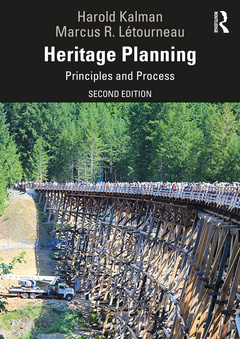Heritage Planning (2nd Ed.) Principles and Process
Auteurs : Kalman Harold, Létourneau Marcus R.

This new and substantially revised edition of Heritage Planning: Principles and Process offers an extensive overview of the burgeoning fields of heritage planning and conservation. Positioning professional practice within its broader applied and theoretical contexts, the authors provide a firm foundation for understanding the principles, history, evolution, debates, and tools that inform heritage planning, while also demonstrating how to effectively enact these processes.
Few published works focus on the practice of heritage planning. The first edition of this book was developed to fill this gap, and this second edition builds upon it. The book has been expanded in scope to incorporate new research and approaches, as well as a wide range of international case studies. New themes reflect the emerging recognition that sustainability, climate resilience, human rights, social justice, and reconciliation are fundamental to the future of planning.
Heritage Planning is indispensable reading, not only for professionals who transform the built environment, but for anyone who wants to understand the ideas and practices of heritage planning and conservation.
For the benefit of student readers, twelve chapters?designed to accommodate the academic semester?are augmented with concise summaries, key terms and definitions, questions, and learning objectives.
INTRODUCTION
- The nature of heritage planning
- Organization of the heritage sector
- Regulating heritage
- Conservation charters and conventions
- Ethics and human rights
- Sustainability and resilience
- Best practices
- Understanding the historic place
- Community engagement
- Value and significance
- Managing change
- The Heritage Plan
PART 1: PRINCIPLES
PART 2: PROCESS
Harold Kalman earned a PhD in architectural history from Princeton University, undertook conservation studies at the University of York and Cornell University, and has academic appointments in heritage conservation at the Universities of Victoria and Hong Kong. He managed a Canadian-based international practice in conservation and heritage planning for four decades. Kalman is the author of A History of Canadian Architecture and many books and articles on conservation.
Marcus R. Létourneau teaches heritage conservation planning at Queen’s University at Kingston, the University of Waterloo, Algonquin College, and the Willowbank School of Restoration Arts, all in Canada. He has a PhD in historical/cultural geography, an MA in cultural geopolitics, a diploma in peace and conflict studies, and a certificate in heritage conservation planning. He completed heritage training in China from ICCROM. He is the Managing Principal of an Ontario-based heritage consultancy and is a practicing professional planner.
Date de parution : 11-2020
17.8x25.4 cm
Date de parution : 11-2020
17.8x25.4 cm
Thèmes de Heritage Planning :
Mots-clés :
Heritage Planning; Historic Place; Heritage conservation; Heritage Planner; heritage sector; Intangible Cultural Heritage; conservation treatment; Burra Charter; heritage values; Historic Urban Landscape; heritage impace assessment; ICOMOS Charter; conservation plan; Historic Preservation; Norman Tyler; Heritage Impact Assessment; Venice Charter; Faro Convention; Social justice; Historic Preservation Plan; Tourism development; Historic Structure Report; Climate resilience; UNESCO Convention; Human rights; Community Engagement Process; Heritage Management Plan; EPBC Act; Public Engagement; Movable Cultural Heritage; Heritage Conservation District; Nara Document; Historic Environment Scotland; Heritage Legislation; Outstanding Universal



